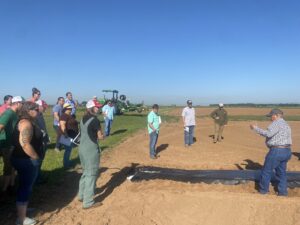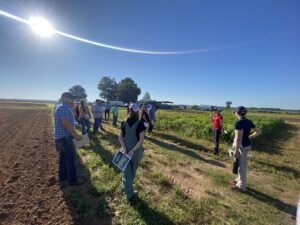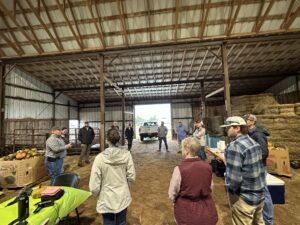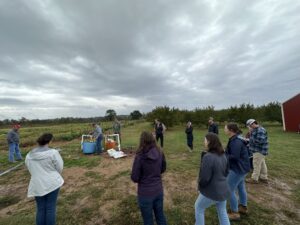Final report for SPDP22-08
Project Information
The PIs have received many requests for information on small-scale sustainable annual plasticulture strawberry production from the Mid-American Strawberry Growers Association, southeastern CES agents and growers in their network. Basic and up-to-date information on the use of sustainable production of strawberries is not currently covered by existing trainings in the Southeast despite great need for the content. Increased understanding of sustainable practices by CES agents will result in greater transfer to growers who will implement practices that promote the health of their farms, families, and communities.
In-field demonstration and virtual field tours will be utilized by our project to increase the capacity of Cooperative Extension Service (CES) agents and Natural Resources Conservations Service (NRCS) personnel to recommend sustainable practices to annual plasticulture strawberry growers in Arkansas and the Southeast. Three in-person field-based trainings will be held throughout the cropping cycle at our research farm and at a grower collaborator farm to tour demonstrations of practices proven to improve the environmental, economic and social sustainability of Southeastern strawberry production, including cover crops, crop rotation, beneficial soil inoculants, biodegradable mulches, efficient water use, and organic and targeted integrated pest management programs.
To expand the reach and lifetime of the project we will then develop three virtual field tours of the field demonstrations to train CES agents across the Southeast. The grower collaborator will be key to providing a grower perspective at each in-person and virtual tour. Printed training materials to support key practices will be developed and provided throughout the trainings.
Our target audience is Cooperative Extension Service (CES) agents and Natural Resources Conservations Service (NRCS) agents in Arkansas and CES agents from across the southeastern United States. These agents serve a range of communities and demographics, including underserved producers.
The objectives of this project are:
- Effectively train CES and NRCS agents on sustainable practices for annual plasticulture strawberry production to provide support for southeastern strawberry growers in the adoption of these practices. “Seeing is believing” and as such our project will demonstrate the use of summer cover crops, crop rotation, beneficial soil inoculants, biodegradable mulches, efficient water use, and organic and targeted integrated pest management practices in plasticulture strawberry production to train CES and NRCS agents at the University of Arkansas Vegetable Research Station and at a grower collaborator’s farm. At the end of the two-year project a minimum of 25 University of Arkansas Cooperative Extension Service (UACES), and 30 Arkansas Natural Resources Conservation Service (NRCS) personnel will be trained in three in-person workshops held at the in-field demonstration plots. An additional 60 Southeastern CES agents will be trained in three online virtual field tours of the established demonstration plots. As a result, participants trained will be able to answer questions on small scale sustainable strawberry production with 80% proficiency which will result in increases in recommendations of these practices to their stakeholders. Changes in participant knowledge will be assessed by comparing pre and post-tests of knowledge at both in-person and virtual trainings.
- Develop a suite of educational materials to support CES and NRCS agents to advise and support growers in the adoption of sustainable strawberry production practices. Developed materials will include three factsheets, 9 full videos, three mini videos and a webpage housed on the University of Arkansas website and the PIs YouTube channel, which will be produced and shared with CES and NRCS agencies across the Southeast. Three factsheets will highlight production, integrated pest management and soil health practices for sustainable strawberry production. Across this range of outreach materials and platforms, we expect to reach a minimum of 1,000 extension workers, industry personnel, and growers in the region in the second year of the project. These contacts will increase their knowledge of and capacity to implement sustainable practices in small scale annual plasticulture strawberry production systems.
- Establish a new Arkansas Discovery Farm site to highlight sustainable strawberry production practices on-farm to growers in Arkansas. The “Arkansas Discovery Farms Program” is designed to demonstrate on-farm effective conservation practices to growers in the region and serve as a model of best management practices. There are currently 12 “Discovery Farms” in Arkansas, only one of which is focused on specialty crops. Collaboration with an Arkansas strawberry grower who effectively integrates sustainable practices into their production systems will reinforce the real-world application of sustainable practices through this training and will contribute to increases in adoption of sustainable practices for small scale strawberry producers in the region and increased in knowledge by UACES and NRCS agents who work on the ground to advise growers daily. The grower collaborator we have identified has a large network, which includes the Mid-American Strawberry Growers Association. Collaboration with the grower and interaction with the growers association will expand the project’s reach to an additional 50 growers in the region. The establishment of a new Discovery Farm has the potential to expand the reach of the project to many more growers across the state in the long-term.
Cooperators
Education
In-field demonstration and virtual field tours were utilized by our project to increase the capacity of Cooperative Extension Service (CES) agents and Natural Resources Conservations Service (NRCS) personnel to recommend sustainable practices to annual plasticulture strawberry growers in Arkansas and the Southeast. Three in-person field-based trainings were held throughout the cropping cycle at our research farm and at a grower collaborator farm to tour demonstrations of practices proven to improve the environmental, economic and social sustainability of Southeastern strawberry production, including cover crops, crop rotation, beneficial soil inoculants, biodegradable mulches, efficient water use, and organic and targeted integrated pest management programs.
To expand the reach and lifetime of the project we then developed a series of 7 YouTube videos highlighting key sustainable management practices to train CES and NRCS agents across the Southeast. One factsheet was also developed to support a key practice needed by organic and conventional growers.
Education & Outreach Initiatives
Demonstrate and instruct CES and NRCS agents on sustainable practices for the summer pre-plant season of strawberry production.
Field Tour Schedule, August 17th, 2023. UA Vegetable Research Station
|
8:30 am |
Welcome |
UACES Introduction Drs. Amanda McWhirt, Aaron Cato, and Hannah Wright
NRCS Introduction Katy Brantley |
|
8:45 am |
Cover Crop Selection and Management & Crop Rotation |
Dr. Amanda McWhirt, University of Arkansas System Division of Agriculture |
|
9:00 am |
Laying Plasticulture Beds and Bed Prep |
Lesley Carr, Steve Eaton, Dr. Amanda McWhirt, and Clyde Fenton University of Arkansas System Division of Agriculture |
|
9:40 am |
Pre-Plant Weed Control and Early Season Management |
Dr. Hannah Wright University of Arkansas System Division of Agriculture |
|
10:00 am |
Strawberry Sprayers: Types and Considerations |
Dr. Aaron Cato University of Arkansas System Division of Agriculture |
|
10:30 am |
Strawberry Plug Plant Production |
Randy Arnold Arnold Family Farm Store
Dr. Amanda McWhirt University of Arkansas System Division of Agriculture |
|
11:00 am |
Pre-Plant Disease Consideration |
Dr. Aaron Cato University of Arkansas System Division of Agriculture |
|
11:30 am |
Lunch
|
|
|
12:30 pm |
Adjourn |
|
100% of participants increased knowledge on cover crop selection, crop rotation, plasticulture bed laying, weed control in early season, strawberry sprayer selection and plug plant production.
Demonstrate and instruct CES and NRCS agents on sustainable practices for the fall post-plant season of strawberry production.
Workshop Schedule
October 26th, Arnold Family Farm Alma Arkansas.
|
9:00 am |
Welcome |
UACES Introduction Drs. Amanda McWhirt, Aaron Cato, and Hannah Wright
NRCS Introduction Katy Brantley |
|
9:15 am |
Tour Newly Planted Strawberry Fields |
Randy Arnold, Owner of Arnold Family Farm |
|
10:00 am |
Tips on Fall Disease and Spider Mite Scouting |
Dr. Aaron Cato University of Arkansas System Division of Agriculture |
|
10:30 am |
Fall Plant Management: Runner Removal, Row Covers & More |
Dr. Amanda McWhirt & Clyde Fenton University of Arkansas System Division of Agriculture |
|
11:00 am |
Weed Control: What are the Options for In-Row and Row Middles? |
Dr. Hannah Wright University of Arkansas System Division of Agriculture |
|
11:30 am |
Lunch |
|
|
12:30 pm |
Adjourn |
|
100% of participants increased knowledge on fall care for strawberry plants in plasticulture production, included scouting, plant management and weed control.
Demonstrate and instruct CES and NRCS agents on sustainable practices for high tunnel strawberry production.
Workshop Agenda
March 28, 2023
Natural Resources Conservation Service
Marshall, Arkansas
|
9:00 am |
Welcome |
UACES Introduction Drs. Amanda McWhirt, Aaron Cato, and Hannah Wright
NRCS Introduction Katy Brantley |
|
9:15 am |
Introduction to the Site & Strawberry Production History |
Clyde Fenton University of Arkansas System Division of Agriculture |
|
9:45 am |
NRCS High Tunnel Cost-Share Program & Opportunities |
Katy Brantley Natural Resources Conservation Service |
|
10:15 am |
Basics of Growing Strawberries in High Tunnels |
Clyde Fenton & Taunya Ernst University of Arkansas System Division of Agriculture |
|
11:00 am |
Tour the Site (irrigation setup, bed prep, fertility management, tunnel design) |
|
|
11:30 am |
Lunch Provided by: Los Locos Restaurant |
|
|
12:30 pm |
Adjourn |
|
100% of participants increased knowledge on high tunnel strawberry plasticulture production, including tunnel basics, irrigation, fertility management and tunnel design considerations.
Demonstrate and instruct CES and NRCS agents on sustainable practices for strawberry production during the spring harvest window.
Workshop Agenda:
May 2, 2023
Vegetable Research Station
Kibler, AR
|
9:00 am |
Welcome |
Drs. Amanda McWhirt, Aaron Cato, and Hannah Wright University of Arkansas System Division of Agriculture = |
|
9:30 am |
Strawberry Taste Test |
|
|
10:00 am |
Tour Variety Trial |
Dr. Amanda McWhirt University of Arkansas System Division of Agriculture |
|
10:20 am |
Fertility Trial (Nutrient Management) |
Dr. Amanda McWhirt University of Arkansas System Division of Agriculture |
|
10:40 am |
Row Middle Management |
Dr. Hannah Wright Smith University of Arkansas System Division of Agriculture |
|
11:00 am |
Bee Vectored Fungicide Trial |
Dr. Aaron Cato University of Arkansas System Division of Agriculture |
|
11:30 am |
Proceed to Lunch Provided by: Airdale Diner |
|
|
12:30 pm |
Adjourn |
|
100% of participants increased knowledge on fall care for variety selection, fertility management, row middle management and use of bee vectored fungicide.
Educational & Outreach Activities
Participation summary:
Learning Outcomes
Project Outcomes
NRCS and CES agents were trained throughout a 4-part series on the basics of sustainable strawberry production practices. Agents reported high likelihood of using the information they gained in their work. New collaborations between NRCS and CES were solidified. The developed videos and fact sheets to support the trainings have been accessed by an additional >900 viewers online.
Information Products
- Summer Cover Crop Management for Plasticulture Strawberries
- Crop Rotation for Plasticulture Strawberries
- Plant Tissue Nutrient Sampling Strawberries
- Calculating Spring Fertigation Rates for Plasticulture Strawberries
- Calculating Nitrogen for Cover Crops & Compost
- FSA6161 Constructing a Cheap and Effective Strawberry Sprayer
- Sustainable Practices for Strawberry Production Training Program
- Arkansas Strawberry Horticulture Discovery Farm
- How-To Build a Cheap and Effective Strawberry Sprayer



